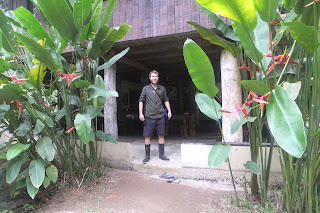Wildlife at Estación Biológica Tamandúa

Up until now, our travel has mostly focused around culture, food and activities so Estación Biológica Tamandúa was the first place we went herping (looking for reptiles and amphibians) and wildlife watching properly. Therefore, here follows a blog post purely about wildlife! Birds in particular, are extremely diverse in Central America. Unfortunately, Greg and I are not bird experts and our interests mostly lie in reptiles and amphibians. However, I think we both appreciate birds a lot more now. A common feature of Estación Biológica Tamandúa, was the hummingbirds which flittered around the flowers planted around the buildings. We did not realise how angry, noisy and territorial hummingbirds are. We would constantly hear angry squeaks and a sound like a hover craft and a pair of hummingbirds would chase each other through the room, close to colliding with our heads. The hummingbirds were also extremely inquisitive. They would fly towards us and hover at eye level for a few se...
